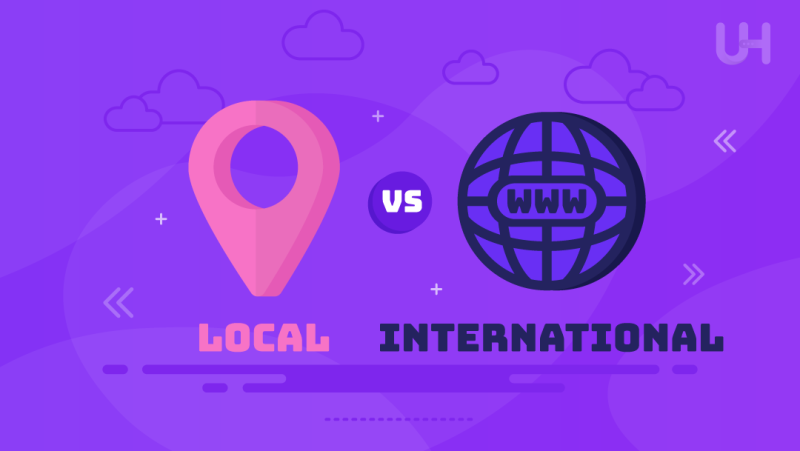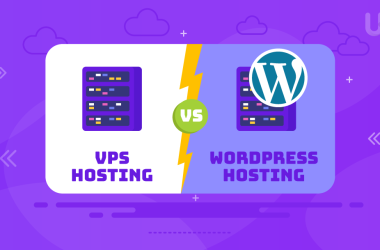If you are launching a website for your business, blog, or store, the first and most vital step in the process might be selecting the domain name. It is the web address that people enter into their browser to find your site, such as example.com.
However, a domain name is not just about its name. You also have to decide on the domain extension. This is the part that follows the name. So, in example.com, the .com represents the extension. In example.co.uk, the .co.uk is the extension.
There are two main types of domain extensions:
- International domains – like .com, .net, .org, .online, .store
- Local domains – like .co.uk (UK), .ca (Canada), .in (India), .de (Germany)
So which one is better? The answer depends on what kind of website you are building, who your visitors are, and how far you want your business to reach.
Let’s have a clear and simple look at both domain types, what they stand for, and how to select the right one for your purpose.
What Is a Domain Extension?

A domain extension is also known as a top-level domain (TLD). It is the part that comes after the domain name. You probably have seen several such as:
- .com – used worldwide, the most popular domain
- .org – used by organizations and nonprofits
- .net – used by networks and tech companies
- .shop, .store, .site – used for online stores and websites
- .co.uk, .in, .us – used for websites in a specific country
The extension signals to the users a quick thought about your site. It is a major factor for building trust, branding, and even ranking with search engines.
What Is an International Domain?

An international domain is a domain that has no limitations on its area of use. It is not a domain that is connected to any country. They are the domains that are most often used by companies, online stores, blogs, and websites that are aiming to reach people from diverse areas of the world.
These are some of the most frequent international domains:
- .com – the most widely used and trustworthy
- .net – usually dedicated to technology websites
- .org – generally used by non-profit organizations
- .store, .online, .shop – suitable for ecommerce businesses
- .icu – a fun option, the abbreviation of “I See You”
Why Choose an International Domain?
A lot of positive factors are associated with the use of an international domain. An international domain is often the most sensible decision if your website is designed for a global audience and you also have in mind the expansion of your business in the future.
It is quite easy to recall as well. A lot of people expect websites to carry the .com extension. Once they hear your brand, they will most probably type it together with .com domain automatically. It can work as a pull factor for your website traffic.
Benefits of International Domains
Trusted by Everyone
.com and .net are the domains that have been existing for numerous years. People trust them. They are aware of safety and reliability. If you want visitors from different countries to come to your site, trust is very important.
Good for Search Engines
Search engines like Google consider .com, .org, and similar domains as global. Hence, they can use your site to represent them in many countries. This means that your business or blog will have more visitors.
A global domain makes it very easy to type, share on social networks, jot down on business cards, or include in adverts. Such domains are so common that people associate with them without any strain and can recall them more easily.
Better for Growing Your Business
In case you are planning to expand your website in the future to different countries or with the new products you still can keep the same domain that an international domain is the one that gives you the space to grow.
An international domain that you have the possibility to grow and not have to change your domain when entering the new markets or introducing new products.
Downsides of International Domains
Many Names Are Already Taken
Due to the popularity of international domains, the best domain names are already taken. Nowadays, finding a good and easy-to-remember domain can be a challenge, especially if you choose .com.
May Not Feel Local
In the case where your business operates only in one country, for instance, a local bakery or plumber, an international domain might be completely out of context. It may not be able to connect with local customers as well as it would have if it has a country-specific domain.
Some Extensions Look Spammy
Domains such as .biz, .info domain, or .xyz domain are frequently abused by the spammers to distribute their mail. As a result, these are the situations where people who do not know you are likely to get frightened at the very first sight of your site or will falsely conclude that it is not secure, even if it is.
What Is a Local Domain?
A local domain is a domain that is registered in a particular country. These are also called country-code domains or ccTLDs that signify a focus on the local country or area.
Examples of local domains:
- .co.uk – United Kingdom
- .ca – Canada
- .in – India
- .au – Australia
- .pk – Pakistan
- .de – Germany
- .fr – France
These domains are great if your business only serves people in one country or city.
Benefits of Localized Domains
Grab the Right Domain While It’s Still Available
Your domain says a lot about your business. If you’re just getting started or thinking about a rebrand, finding the right one shouldn’t be a hassle. With UltaHost, it’s simple to search, register, and get moving. No complicated steps or extra fluff. Just the name you need to grow your online presence.
Better for Local Customers
People in the UK who are buying a product or service may not choose a .com domain, but a .uk domain without a doubt. It means you are from the same area and have local prices, support, and delivery.
Higher Ranking in Local Searches
Google aims to give users the most relevant results. For example, if a person from Canada types “buy shoes online” in the search bar, a .ca website may be displayed first, before a .com site. That is local SEO, an approach to making your site the top of local searches, and thus, your visitors will be from a local community.
Feels More Personal
The business with a local domain immediately feels as if it is a part of the community. This can particularly be true if the efforts of companies are directed towards older or less tech-savvy users, as the trust factor is particularly important with this group.
Downsides of Local Domains
Limited Reach
If you rely only on the domain with the extension .in for your website, then it is highly unlikely that people from the US or the UK will see it among their top search results. As a result, expanding your business to new markets will become very difficult.
Not Ideal for Global Business
On the other hand, if your business plan is to distribute goods or services to several countries, then a local domain will be a drawback. Unintentionally, businesses operating from foreign countries unconsciously alienate the locals, giving them the impression that they are not the target customers.
Sometimes You Need Local Documents
Some local domains require you to live in that country or provide local documents. For example, to register a .com.au domain, you may need an Australian business number.
Real-World Examples
Let’s assume you own an online clothing store:
- For instance, if you want to sell to everyone, go for a domain like stylehub.com or stylehub.store
- However, if you only sell in the UK, choose stylehub.co.uk
- Moreover, if your business is located in Canada, and you serve Canadian customers, opt for stylehub.ca
Indeed, if somebody comes across your domain, it will immediately be clear to them who your store is meant for. This, in turn, will lead to the right customers walking in.
Can You Use Both?
Of course, businesses are free to register both international and localized domains. Essentially, this is a clever move on their part due to two main reasons:
- Brand Protection – Your name is protected, and no one can use it in another country
- Better Marketing – You can divert UK traffic to your .co.uk site and global traffic to your .com site
As an illustration:
- techstore.com – for global customers
- techstore.co.uk – for UK shoppers
- techstore.in – for Indian customers
They all would refer to the same company just differently depending on the market.
How to Choose the Right One
Below are some simple questions that will give you insight on how to select the right domain for you:
Who Are Your Customers?
- Local only: If your customers are from only one country, a local domain makes sense.
- Worldwide: If your customers come from many countries, go with an international domain.
What Are Your Future Plans?
- Want to grow globally? Start with a .com or similar domain now.
- Staying local forever? A local domain works fine.
Do You Want More Trust in a Specific Country?
- Local domain indicates that you are in the same country.
- People might be more convinced to buy from someone that is just “around the corner.”
SEO (Search Engine Optimization) and Domains
Your domain name influence how your site ranks on Google.
- Localized domains are a way to make your site show up higher on local searches.
- International domains are a way to make your site show up more in global searches.
- Besides, having good content, fast site speed, and mobile-friendly design also give you a huge boost.
If SEO is a priority for your business, come up with your main keywords and figure out where your audience is.
Should You Change Domains Later?
It is best to pick the right domain from the beginning. Later, changing your domain might not be good. You could lose the traffic or your customers might get confused.
If you plan to expand in the future, try to find a name that will be suitable then as well as now. Moreover, even if your business is going to be small initially, your domain is going to be the one that grows with you.
What About Buying Multiple Domains?
Some people own many domains in order to have their brand protected. This strategy works only in such cases as:
- Need to stop the copying of your brand name
- Desire to run different versions of your site in different countries
- Need to test which one brings more traffic
Just remember to manage them well and use redirects if necessary, so people won’t get confused.
Tips for Picking a Great Domain Name
The following are some concluding tips on how to come up with an amazing domain name:
- Make it short and uncomplicated – Easy to type and remember
- Avoid numbers and hyphens – These confuse people
- Use keywords if possible – Like shoes, fashion, tech, etc.
- Check social media – Try to get the same name on Instagram, Facebook, etc.
- Act fast – Good domain names are taken quickly, so register it when you find one
Final Thoughts
Selecting the perfect domain name is undoubtedly one of the most crucial aspects of launching a website. A domain name is the first thing that people see and hence, can be a key factor in them trusting you and remembering your brand.
- If you want to target only your local area, then a local domain is the best choice for you.
- However, if you want to be known internationally and access a global audience, then an international domain is the way to go.
- Moreover, you can also leverage the advantages of each by combining them.
Also, ensure that your domain reflects your objectives. Take care that it is brief, unambiguous, and simple to spell. With the right domain in your hand, you can now proceed to build your website and expand your online presence.
Once you’ve picked the right domain, keeping it secure is just as important. With SSL Certificate from UltaHost, your site gets that extra layer of protection and your visitors get peace of mind. It’s a simple step, but it goes a long way in making your website look trustworthy from the very beginning.
FAQ
What is a domain name?
A domain name is your website’s address, like myshop.com, that people use to visit your site.
What is the difference between a local and international domain?
A local domain is linked to one country (like .co.uk), while an international domain (like .com) works globally.
Which domain is better for local businesses?
A local domain is better if your business only serves people in your country or city.
Is .com a local or international domain?
.com is an international domain used by websites around the world.
Can I use both local and international domains?
Yes, you can register both and use them to target different audiences.
Do local domains help with SEO?
Yes, local domains can help your site rank better in country-specific Google searches.
Should I change my domain later if I grow?
It’s best to choose a domain that fits your long-term goals so you don’t have to change it later.








